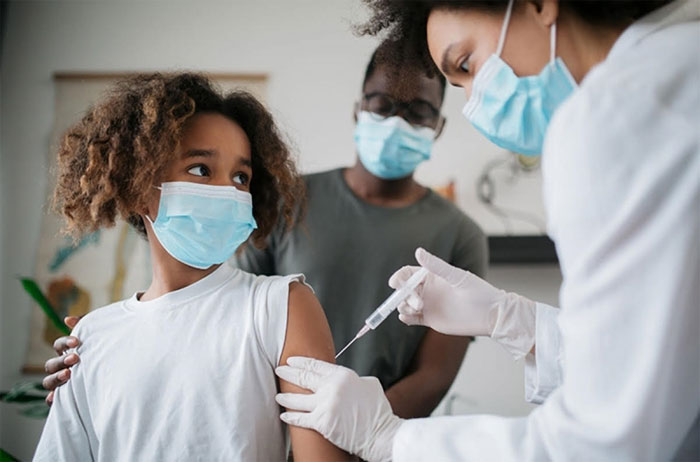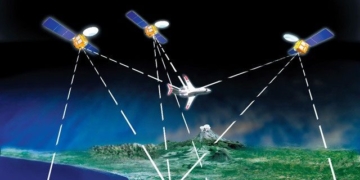Children should sit or lie down during vaccination, which can help reduce pain and discomfort at the injection site by applying a clean, cool, and damp cloth to the area, along with gentle arm movement.
Important Notes When Vaccinating Children Against Covid-19
The Ho Chi Minh City Center for Disease Control (HCDC) on October 26 cited recommendations from the U.S. CDC regarding the Pfizer-BioNTech vaccine for individuals aged 12 and older. Specifically:
Before Vaccination
Parents should prepare their children by discussing what will happen during the vaccination process. As with other vaccines, children will undergo a screening examination before receiving the Covid-19 vaccine. Parents need to inform the physician about any allergies their child may have so that appropriate vaccination instructions can be provided during the screening.

The recommended Covid-19 vaccine for children is Pfizer-BioNTech.
During Vaccination
The Pfizer-BioNTech vaccine is designated for individuals aged 12 and older and helps protect against Covid-19. This vaccine is safe and effective, meaning children cannot contract Covid-19 from the vaccine. They will need to receive two doses, with the second dose administered three weeks after the first, at the same dosage as adults.
Children can receive the Covid-19 vaccine along with other vaccines during the same visit, without needing to wait 14 days between vaccinations. Throughout the vaccination process, parents should comfort their children. Additionally, to prevent fainting and related injuries, children should sit or lie down during vaccination and for 15 minutes afterward.
After Vaccination
Parents will be asked to keep their child in the observation area for 15-30 minutes after vaccination to monitor for any severe allergic reactions that may require immediate treatment.
Children may experience some side effects, which are normal signs that their body is building protection. These side effects may affect the child’s daily activities but will typically resolve after a few days.
Some common side effects may occur at the injection site (pain, redness, swelling) and systemically (fatigue, headache, muscle pain, chills, fever, nausea).
If children experience any pain or discomfort after vaccination, parents may use the over-the-counter medications discussed with their physician, provided there are no other contraindications. Pain and discomfort at the injection site can be alleviated by applying a clean, cool, and damp cloth to the area, along with gentle movement of the child’s arm.
Moreover, to reduce discomfort from fever, ensure the child drinks plenty of fluids and dresses lightly. Importantly, monitor the child for any redness or worsening of the injection site after 24 hours, or if any side effects cause concern or do not resolve after a few days, contact the nearest healthcare facility for assistance.
It takes time for a child’s body to build protection after vaccination. Individuals are considered fully vaccinated two weeks after receiving the second dose of the Pfizer-BioNTech vaccine. HCDC recommends that in addition to vaccination, it is still essential to follow the 5K measures to achieve the highest effectiveness in combating the Covid-19 pandemic.
Globally, the World Health Organization (WHO) recommends the Pfizer-BioNTech vaccine for children against Covid-19.
Common Questions About Covid-19 Vaccination for Children
Which Vaccine is Used for Children Over 12 Years Old?
The U.S. Food and Drug Administration (FDA) has granted emergency use authorization for the Pfizer vaccine for children over 12 years old. This vaccine is administered in two doses, 21 days apart. The second dose may be given up to 6 weeks after the first dose.
Research shows that the Pfizer vaccine is 100% effective in preventing Covid-19 in children aged 12 to 15. It is also 91% effective in preventing severe illness from Covid-19 in individuals aged 16 and older, including those with the Delta variant.
Can the Vaccine Affect Cardiovascular Health?
In the U.S., there have been reports of myocarditis and pericarditis cases following the administration of mRNA Covid-19 vaccines, particularly in males aged 16 and older. These reports are very rare, and the U.S. CDC is investigating whether there is any correlation with Covid-19 vaccination.
Among the reported cases, myocarditis occurred a few days after the second dose. Most individuals recovered quickly after receiving treatment and rest.
Symptoms to monitor include chest pain, shortness of breath, rapid heartbeat, palpitations, and feelings of anxiety. If children experience any symptoms within a week of receiving the Covid-19 vaccine, contact the vaccination center for guidance and medical care.
Can the Vaccine Affect Reproductive Health or Menstruation?
There is no evidence that any Covid-19 vaccine causes reproductive health issues.
One study found that some women experienced temporary changes in their menstrual cycle after vaccination. It is unclear whether vaccination caused these changes, as there has not yet been further research on this issue. In reality, many factors can affect the menstrual cycle, such as infections, stress, sleep issues, and changes in diet or exercise.
When Are Children Considered Fully Vaccinated?
Children are considered fully vaccinated two weeks after receiving their second dose of the Covid-19 vaccine.


















































